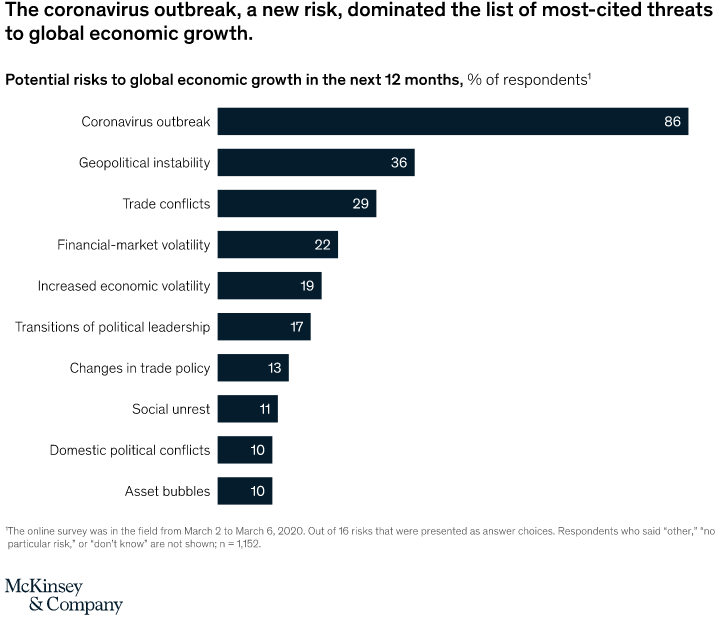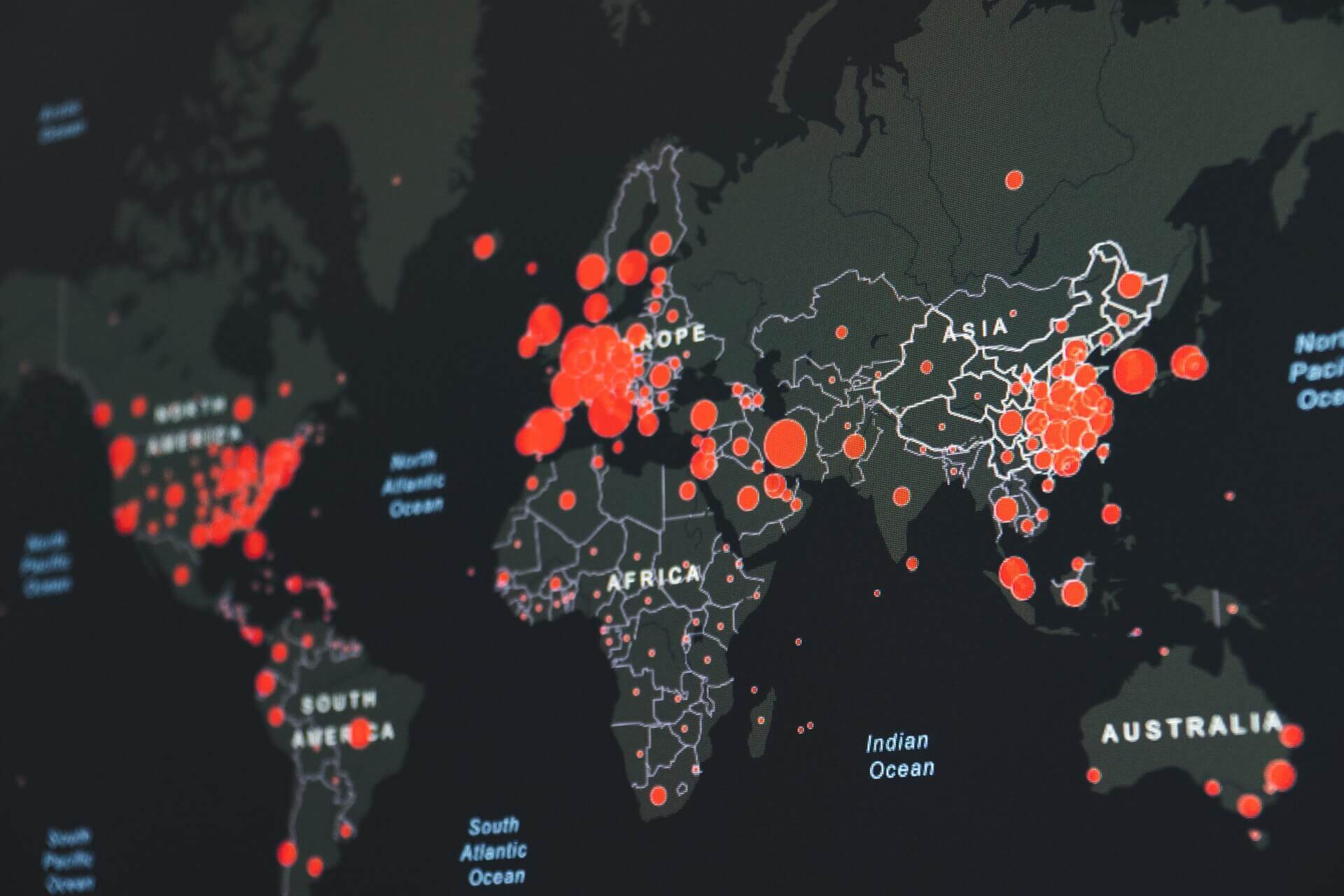COVID-19 certainly was an unexpected factor that threw all businesses and activities a curveball. From schools to healthcare organizations to restaurants to small farmer market businesses – everyone is learning to live under these new circumstances. The additional layer is added by the fact that this is a pandemic – i.e. it’s global, not just a thing contained within one country.

What should the business do?
We’ve already talked about the ideas for offline businesses in various industries. This article will focus on various business strategies and insights in general with special attention to the digital world.
#1. Take care of your clients
If your business is struggling, chances are your clients are struggling as well. Use this time of quarantine to show your customers that you actually care about them. While it doesn’t exactly bring immediate results, you can build loyalty and lasting relationships, which will pay off big time.
Communicate with your customers more during this time without trying to sell your products or services. Reach out to them to understand their needs and situation. Talk to them about your business plan on how you are dealing with the crisis – customers appreciate being in the know.
The period of crisis is definitely not the time for raising prices, introducing pre-payments to minimize your risks, or creating new ways of monetization. It’s the time for free and freemium solutions and offers, which will work toward raising your brand awareness. It’s time to support your customers and show your business loyalty to them. Why? Because at the moment, most businesses are competing for the consumer flow, because later this is what will convert into income.
Additional ideas on how to help your clients:
- Install hand sanitizers at your store or business location (to protect both your visitors as well as your employees)
- Adjust your return policy to meet the new reality’s requirements
- Connect your business with a delivery service to avoid closing your business locations altogether.
- Try, if possible, to move all possible offline activities to the online world.
- Adapt and monitor the prices also to avoid capitalizing on the crisis for short-term gains.
#2. Take care of your team
Your employees are the gears that make your business go, so that’s another area where the business should show care.
- If it is possible to move your employees to work from home – do it.
- If you have to keep the business locations open, ensure your employees have proper protective equipment or anything that would make their work a safe environment.
- If your employees can’t work from home (whether because of the business’ peculiarities or because they have to take care of their kids, etc.), provide them with a way to stay above the water. Possibly, you won’t be able to pay them their standard salary as usual, but remember – this crisis will pass and you will need motivated employees to continue working for you. Help them now, and they will help you later.
Moreover, many governments have developed and adopted whole packages of laws aimed at helping businesses to stay afloat – lowering taxes, reducing the loans’ interest rates, etc. For example, the US Small Business Administration has a great guidance page on government help for small businesses during the coronavirus. Our recommendation to you would be to find out what your country’s policy is.
#3. Get ready for digital transformation
The good news is that every crisis always comes to an end, even the Great Depression. We do realize that it’s never easy during the crisis period itself, but while we’re experiencing this decrease in activities and revenues, take this time to get ready for the next stage.
If anything, this current situation showed us the benefits of being digital. Zoom stock prices nearly doubled since January 2020 ($68.72 before and today it’s $121.93, with the highest mark at $159.56). Restaurants had to close their doors to the visitors, but those that already provided delivery and had websites kept their heads above the water. Many other businesses are capitalizing on digital tools to help them continue their operations.
Therefore, use this period to get your business ready for digitalization (if you’re not there yet) and strengthen your processes (both for those who are already digital and those who are not.)
As a bonus, this will keep you focused on the positive side and future growth.
#4. Be ready to adapt
Robert F. Kennedy said in one of his speeches, “May you live in interesting times.” Some cite this as an ancient Chinese curse, which it is not, but that’s not the point.
Like it or not, we do live in the “interesting times” right now. Most people around the globe have to adapt to the new reality we’ve been rudely shoved into. The most annoying and frustrating thing about it (besides the danger of people dying, which goes without saying) is the uncertainty. No one knows for sure what the future holds (we can only try to predict the events based on the past), and no one knows when this will end (it will, however). Therefore, mobilize your resources and be ready to adapt your business strategies on the fly for new circumstances.
One of the ways to do it is to get your top teams together (online) and brainstorm on what would you do and what will your business be like if:
- Everything goes as planned (Plan A)
- You’ve lost 50% of usual business activities (half of your clients cannot purchase the goods anymore, half of the employees can’t work from home, etc.)
- You’ve lost 75% – 100% of the usual business (what if the things you’ve invested in don’t work in the future, major disruptions to the business.)
Those are scary things to consider, but if you have a plan for surviving those things, it will help you and your employees to fight off the panic. If you need ideas, Boston Consulting Group has created a rapid response checklist, which is a very convenient and useful tool.
#5. Channel your creativity
Two personal characteristics are especially valuable right now: creativity and strategic thinking.
Active and entrepreneurial people are the ones who will be able to make the most of the current situation. Already there are stories about various businesses and organizations transforming their models to fit their needs.
One thing, however, to be noted (might be obvious, but we’ll say it anyway): Please, don’t use this time just to gain personally and make a quick profit because people are desperate. This tactic isn’t worth it in the long run. We’re all in this situation together and it’s much better to help each other than to become a king of the mountain leaving wounded people behind. It’ll be lonely up there.
#6. Use available digital tools
“[COVID-19] is a wake-up call for organizations that have placed too much focus on daily operational needs at the expense of investing in digital business and long-term resilience.”
Sandy Shen, senior director analyst from Gartner
Indeed, many companies have put off the need for digitalization for years. However, we see schools moving online, hospitals and doctors heavily relying on telemedicine, events going virtual, etc. There is even an online nanny that can spend an hour with your child, playing games with him or her, dancing, and talking, while you have a chance to do what you need.
Digital technology is the modern-day business saver. For example, numerous restaurants and cafes remain open thanks to delivery options and online ordering. HUSPI has created a three-part project for this very purpose that includes:
- A powerful admin panel, which allows you to manage orders and assign deliveries
- A cross-platform mobile app for delivery personnel
- A Telegram/Whatsapp bot is activated by the QR code of your restaurant, which allows people to see the available menu, order what they want, and pay – all without having to leave the messenger app.
Send us a message if you would like to find out more about this delivery solution.
#7. The world after COVID-19
According to the predictions, which are easily believable, after this crisis, people will become even more attached to their smartphones. Once you have gotten used to the easiness of ordering all your groceries online and having them delivered to your doorstep, it will be hard to go back. Many kids will realize that they actually enjoy distance learning a lot more than having to go to school every day (some will not, and that’s also okay).
According to McKinsey’s forecasts, the global GDP will “enjoy” a wild ride this year. Even the most optimistic prognosis talks about the economy recovering in European countries and the US only in Q4. In comparison, during the 2008 crisis, the rollback was three times weaker. What does it mean? People’s purchasing power will decrease and most businesses will experience a decline, simply because their products will not be in demand.
From a pessimistic perspective, of course, everything is lost. However, from the optimistic perspective, competition becomes lower and the population numbers remain more or less the same, which means that it’s a matter of time before the purchasing power returns to the pre-crisis level.
Therefore, sincerely love your clients right now, take care of your team, go digital (nothing huge or complex in terms of solutions, but aim to optimize the smallest processes and use ready-made solutions), and be ready to conquer new horizons.
The world will never be the same ever again. Will it be a good world? That’s for us to decide. Focus on earning your reputation, because the decisions you make under pressure show your true essence.
Wondering about time-to-value?
Request a no-obligation discovery call and receive a preliminary estimate tailored to your KPIs.


